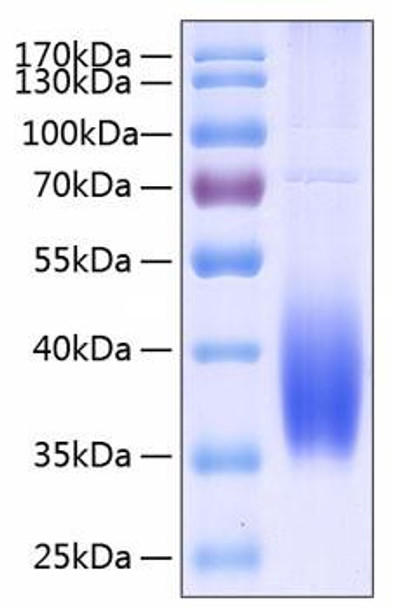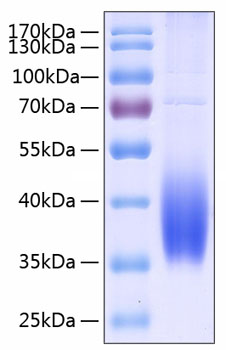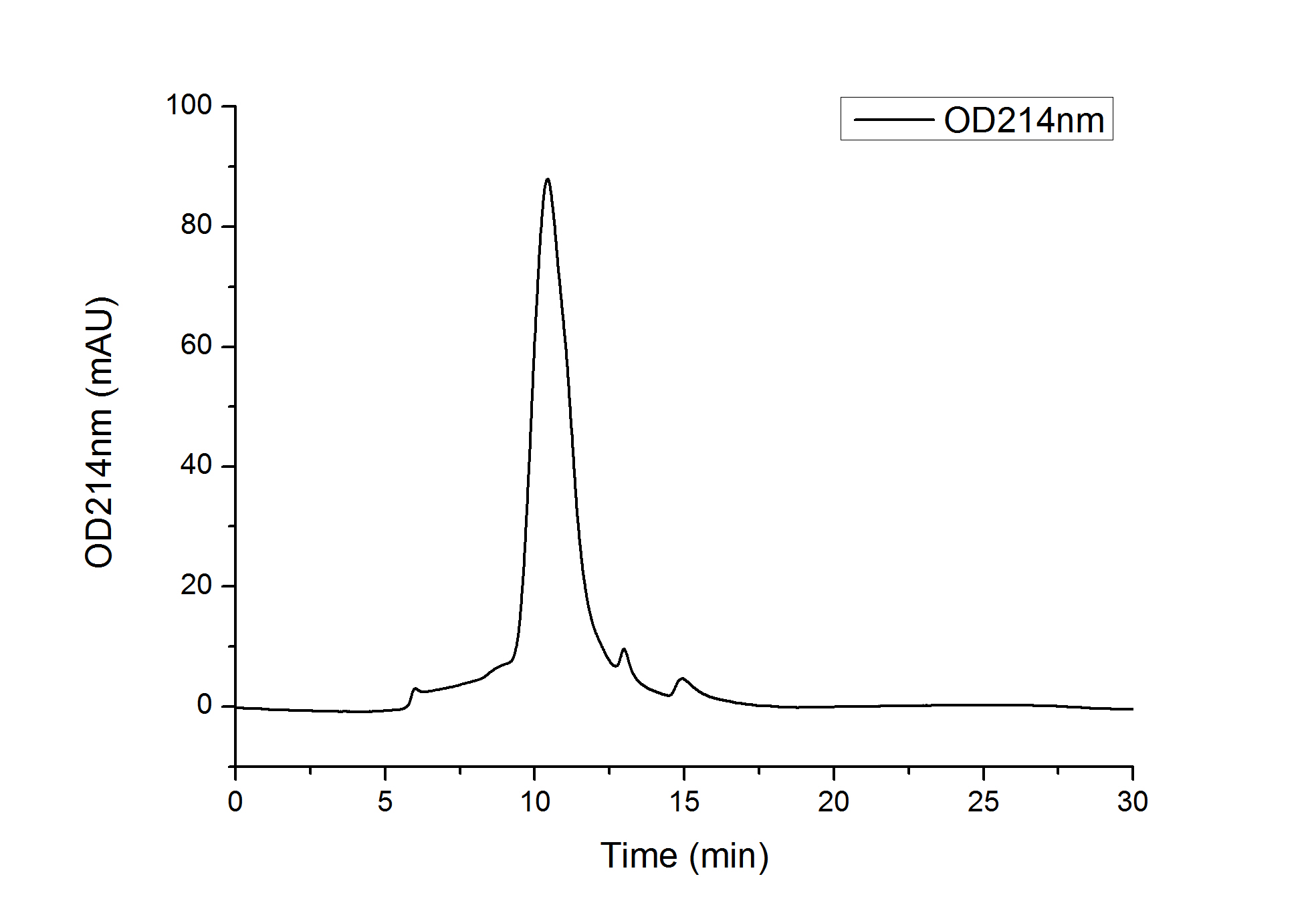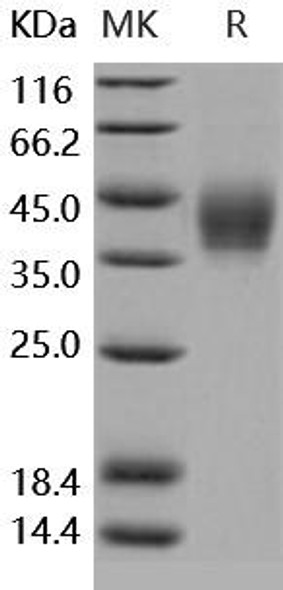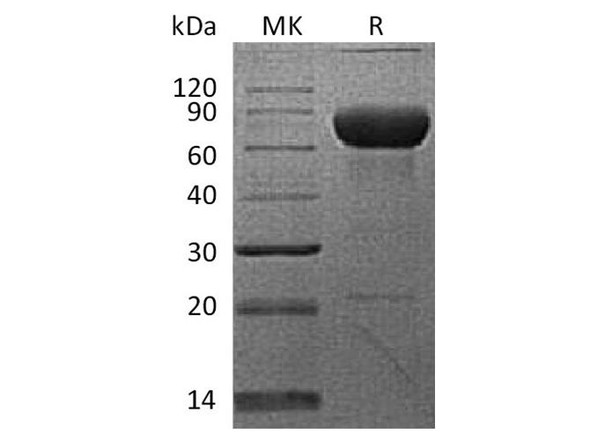Description
Recombinant Human B7-DC/PD-L2/CD273 Protein
The Recombinant Human B7-DC/PD-L2/CD273 Protein is a biologically active recombinant protein that plays a significant role in various cellular processes and signaling pathways in human biology. This protein is widely employed in immunological research, cell biology studies, protein-protein interaction analyses, and therapeutic development, providing researchers with a reliable tool for investigating B7-DC/PD-L2/CD273 function and its implications in health and disease.
This product (SKU: RPCB0211) is produced using advanced expression systems and features a C-His tag for convenient detection and purification. The protein exhibits a calculated molecular weight of 23.40 kDa with an observed molecular weight of 35-50 kDa under denaturing conditions, achieving ≥ 95 % as determined by SDS-PAGE;≥ 90 % as determined by HPLC.. Functional bioactivity has been validated through rigorous quality control assays, confirming its suitability for demanding research applications.
Key Features
| High Purity by Affinity Chromatography | |
| Mammalian & Bacterial Expression Systems | |
| High lot-to-lot consistency via strict QC |
| Product Name: | Recombinant Human B7-DC/PD-L2/CD273 Protein |
| SKU: | RPCB0211 |
| Size: | 20 μg , 50 μg , 100 μg |
| Reactivity: | Human |
| Synonyms: | B7DC, Btdc, CD273, PD-L2, PDCD1L2, PDL2, bA574F11.2, PDCD1LG2 |
| Tag: | C-His |
| Calculated MW: | 23.40 kDa |
| Observed MW: | 35-50 kDa |
| Gene ID: | 80380 |
| Protein Description: | High quality, high purity and low endotoxin recombinant Recombinant Human B7-DC/PD-L2/CD273 Protein (RPCB0211), tested reactivity in HEK293 cells and has been validated in SDS-PAGE.100% guaranteed. |
| Endotoxin: | < 0.1 EU/μg of the protein by LAL method. |
| Purity: | ≥ 95 % as determined by SDS-PAGE;≥ 90 % as determined by HPLC. |
| Formulation: | Lyophilized from a 0.22 μm filtered solution of PBS, pH 7.4.Contact us for customized product form or formulation. |
| Bio-Activity: | Measured by its binding ability in a functional ELISA. Immobilized Recombinant Human PD-L2 at 5 μg/mL (100 μL/well) can bind Recombinant Human PD-1 with a linear range of 0.3-1.2 μg/mL. |
| Reconstitution: | Centrifuge the vial before opening. Reconstitute to a concentration of 0.1-0.5 mg/mL in sterile distilled water. Avoid vortex or vigorously pipetting the protein. For long term storage, it is recommended to add a carrier protein or stablizer (e.g. 0.1% BSA, 5% HSA, 10% FBS or 5% Trehalose), and aliquot the reconstituted protein solution to minimize free-thaw cycles. |
| Storage: | Store at -20℃.Store the lyophilized protein at -20℃ to -80 ℃ up to 1 year from the date of receipt. After reconstitution, the protein solution is stable at -20℃ for 3 months, at 2-8℃ for up to 1 week. |
Programmed Death Ligand 2 (PD-L2), also known as B7-DC and butyrophilin-like protein, is a member of the B7 family of proteins that provide signals for regulating T-cell activation and tolerance.PD-L2 is expressed on dendritic cells, subsets of activated CD4+ and CD8+ T cells, and memory B cells that differentiate into plasma cells. At inflammatory sites such as rheumatoid arthritis, allergen exposure, and virus infection, PD-L2 is up-regulated on synoviocytes, infiltrating macrophages, dendritic cells, and airway epithelial cells. PD-L2, along with B7-H1/PD-L1, binds to T cell PD-1 where it promotes IFN-gamma production and CD40 Ligand up-regulation while inhibiting IL-4 production. In addition, PD-L2 binds to RGM-B on macrophages and alveolar epithelial cells, supporting respiratory immune tolerance. In asthma, PD-L2 suppresses IL-5 and IL-13 production, promotes IL-12 production by dendritic cells, and supports allergen-induced airway hyper-responsiveness and mucus production.

